- Home
- Mark Pryor
The Paris Librarian Page 10
The Paris Librarian Read online
Page 10
“And you didn’t see anyone else with him?”
“There wasn’t anyone, no.”
“How can you be so sure?”
“Because I’d already locked the door to the basement from the back of the library. The only way out was the way I’d come. Paul followed me back upstairs and we locked the door and left.”
“Could someone have stayed behind the stacks, maybe in the atelier?”
She frowned in thought. “But why? I mean, it’s possible, I suppose, but I could see through the shelves that the door to the atelier was closed, and if the light had been on, I expect I would have seen that, too, under the door.”
“So, if someone was down there, you locked them in?”
“Definitely. And I guess Paul could have come back later and let someone out, but I saw him walking away, he seemed normal and not . . .” She searched for the right word. “Not anxious, I guess. He was happy and joking with me, like always.”
“And if he was down there, why would he bother being secretive?”
“Précisément. No reason at all. Perhaps if he was having an affair, but Mademoiselle Gregory had left the library about thirty minutes before.” She waved a dismissive hand. “Quite apart from that, he adored her. I would bet everything I own he wasn’t having an affair.”
“And she adored him, too?” Hugo couldn’t help but ask.
She held his eye for a moment, and when she spoke her voice was soft. “Monsieur Marston, I told you about that incident because . . . I am not sure why, now. You seem convinced that something is amiss at the library right now. That night I thought something was wrong, too, at least for a few minutes. I don’t know why Monsieur Rogers was down there, I don’t have any idea what he was doing or why he didn’t reply when I called out. Perhaps he was off in his own world, thinking about his novel.”
Hugo knew he was being chided. “You’re right, I didn’t mean . . .”
She held up a finger. “I had the utmost respect for him, and I still do. I can assure you, he was not having an affair, and his relationship with Mademoiselle Gregory cannot possibly be of concern to you or any other policeman.”
Hugo nodded to show he understood. “I meant no offense. Paul was a friend of mine, too, and I’m struggling to make sense of his death, and now Sarah’s. Please, forgive me.” The strength of her feeling had taken him by surprise, making Hugo feel genuinely chastened but at the same time raising other, rather ugly, thoughts in his mind. Specifically, did Michelle Juneau herself have feelings for Paul Rogers? Was it possible that she’d been the one in the basement with him, and this story was her way to explain away anyone seeing them leave the library together?
And then again, maybe it was all nothing. A colleague of his at the FBI had once told Hugo that if all you had were questions and no answers, you were looking in the wrong direction, seeking the wrong thing. Right now, he sure was heavy on questions and light on answers. For now, he thanked Michelle Juneau for her time, and stepped out of her office and into the main library. To his left was the entrance, with the circulation desk and conference room, the busiest part of the library. To his right it was quieter, and Michael Harmuth stood between two stacks, nose tipped in the air as he looked through his glasses at the spines of some books. He looked over as Hugo moved toward him.
“What’re you doing back here?” Harmuth asked.
“Bearer of sad news, I’m afraid. Somewhere we can talk?”
“Jesus, what now?” Harmuth shook his head and led Hugo to the nook they’d occupied previously. “I guess I should sit down.”
Hugo did as well, and told him as gently as possible about Sarah Gregory, leaving out as many details as he could. Including the possibility she’d been murdered. Harmuth paled as Hugo spoke, his shoulders visibly drooping.
“That poor girl,” Harmuth said.
“She must have loved him very much,” Hugo said quietly.
“She did. And I suppose I should find some comfort in the idea that they’re together now,” Harmuth said. “But I don’t. Maybe that’ll come later.”
“I think I should go see Paul’s mother. Someone will need to arrange the funerals. She’ll almost certainly need the assistance of the embassy.”
“No.” Harmuth straightened. “We’ll do it. It’s the least we can do. We may not have the know-how but we have the funds, and with Sarah gone now, too, there’s no need to burden Paul’s mother. Absolutely not.” He stood, as if the possibility of a specific task had taken him over, pushing the despair aside and allowing a surge of energy and resolve to sweep over him. “I shall start immediately.”
Hugo didn’t have the heart to tell him the bodies probably wouldn’t be released yet, hoping he’d focus on the process before trying to contact the police or medical examiner. He watched Harmuth walk away, then walked to the front of the library and dialed Tom.
“Hugo, you quit your job?”
“Funny. I’m working from home.”
“In that case, bring me a sandwich, I’m in the bathtub.”
“Didn’t need that image. And by ‘home,’ I meant library.”
“I see. What can I do for you?”
“I need you to find someone.” Hugo gave him the name, and Tom let out a low whistle.
“Sounds like fun,” Tom said, “but I gotta find one other thing first.”
“What’s that?”
“The soap.” Tom said, as the sounds of splashing came down the phone. “I dropped it so I know it’s in here somewhere. Maybe under my—.”
Hugo shuddered and quickly hung up.
That night he had drinks with Merlyn, Miki, and Tom, but he abandoned them at eight to have dinner with Claudia, a formidable four-course meal at Il Vino on Boulevard de la Tour-Maubourg. Hugo hadn’t known what to expect, accepting Claudia’s late-afternoon invitation without knowing anything about the restaurant. In truth, it had been more of an insistence than an invitation—she’d wanted the scoop on Merlyn and Miki Harrison, and she wouldn’t take no for an answer.
The waiter greeted her like an old friend, and Hugo smiled to himself as he caught the young man admiring his customer’s figure. Hugo didn’t blame the man; she looked gorgeous in her black skinny jeans, a silvery blouse, and a fitted black blazer.
As they settled into their booth, the waiter handed them small, leather-bound menus but Claudia waved them away.
“Comme d’habitude, Henri.”
“Same as usual?” Hugo asked. “You’re a regular?”
“Regular enough. Trust me, you won’t regret it.”
“So how does it work?”
“They’ll bring us a glass of wine for each course, and pair it with something or other.”
“Something or other?”
“Chef’s choice. You like surprises, right?”
“Sure. I’m not a picky eater. Bring it on.”
The first serving of wine came in a black glass to disguise its color, and the waiter left them to enjoy, and guess, what they were drinking. The puff pastry filled with foie gras that accompanied it, he was more than happy to announce.
“This,” Hugo said after swallowing a morsel, “is absolutely amazing. Fantastic.”
Claudia smiled. “Told you. Now guess the wine.”
“Not my forte.”
“Oh, come on. Try.”
“Fine.” Hugo took a sip. “It’s white, I can tell you that much. Very light, so not a chardonnay, but it doesn’t have that grassy taste of sauvignon blanc. I don’t know, I really don’t.”
“Me neither,” she laughed. “But isn’t this fun?”
“It really is,” he agreed. “Kind of like Christmas for hungry grown-ups.”
The waiter returned after fifteen minutes and smiled kindly as they tried to guess the wine.
“A Riesling,” he said finally, “and this one is from the Basque region.”
The meal took them another ninety minutes, four courses plus the amuse-bouche and a sorbet to cleanse the palate before dessert. I
t was only at the end that Claudia mentioned Miki and Merlyn.
“I’m sure I told you about Merlyn ages ago,” Hugo said. “You remember hearing about my adventure with the crazy hangman in England?”
“Oh, right, something about going undercover at a kinky party.”
“That’s the part you remember?” Hugo laughed. “But of course it is. Anyway, Merlyn was my . . . tour guide, I guess. She helped me out a lot.”
“And her pretty friend?” Claudia said it with a twinkle in her eye, but Hugo felt that she was watching him closely, curious about his reaction to the question, and the girl in the question.
“Pretty, indeed,” Hugo scoffed. “She’s gorgeous. Stunning. Have you seen her legs? Like an athlete’s, I’ve never seen a pair like them.”
“You won’t make me jealous, Hugo.”
“Perhaps, but I can have fun trying.”
She reached over and squeezed his hand. “I know the chef. For me, he’d put a little cyanide in your dessert.”
“That so? And would you wear black at my funeral?”
She gave a casual shrug. “Sure, if I could find time to attend.”
“Tom would hunt you down, you know that, right?”
“Oh, for sure. He’d hunt me down and marry me.”
Hugo raised an eyebrow. “You’re the marrying sort all of a sudden?”
“I could make an exception for Tom.”
“We could have a double wedding—me and Miki, you and Tom.”
“Nope.” Claudia shook her head. “You’re dead in this scenario, remember?”
Hugo laughed. “I forgot.” He raised his glass to her. “Here’s to cyanide-free dessert.”
She clinked her glass against his. “For now, anyway.”
The mention of cyanide had made him think of Paul. Not that his friend had been poisoned, only that if he had died of unnatural causes, poison seemed like the most likely way. Except, of course, the lack of puncture wounds and clean tox screen. But Hugo decided to tell Claudia about it, get her impressions and maybe rouse the journalist into helping him poke around the foggy corners of events.
First, he finished telling her about Merlyn and Miki, the latter’s interest in the Severin collection. Claudia had heard the rumors about Severin’s involvement as a spy, but she hadn’t heard about the dagger, the Gestapo story.
“Speaking as a journalist, proving that story would be quite a scoop,” Claudia said.
“Agreed.” Hugo then laid out the facts as he knew them, Paul’s death followed by Sarah’s and the bruises on her neck and chest. And, most significant to him, the figure in Sarah’s apartment at the time she died.
“Definitely murder,” Claudia concluded.
“I spoke to Camille yesterday. She’s still not convinced. No evidence in Paul’s case and the marks on Sarah are inconclusive.”
“And the stranger in her apartment?”
“As Camille pointed out, maybe someone innocent who found her and panicked.” He shrugged. “Or maybe I didn’t hear anyone at all, I certainly didn’t see anyone.”
“Your instincts and senses are pretty good.” Claudia nodded, thinking. “Perhaps the first, someone was there and panicked. After all, you wandered in and found her, I suppose someone else might have.”
“Maybe, but I’m not buying it.”
She paused, her lips pursed in thought. “Why would someone kill Paul and Sarah?”
“I can’t help thinking it has to do with the Severin papers, the dagger, and that great scoop.”
“That’s assuming it even exists.”
Hugo smiled. “That’s what I intend to find out tomorrow.”
“How?”
“I asked Madame Severin’s former personal assistant and couldn’t get a straight answer.” Hugo took a measured sip of wine. “So tomorrow I’m going straight to the source.”
“Wait.” Claudia sat up straight. “You’re going to see Isabelle Severin?”
“I sure am.”
“Is she expecting you?”
“Not exactly. Tom located her and I plan to use my wiles and charm to get in to see her.”
“I’m sure it’ll be a worthwhile visit, handsome.” A smile spread slowly over Claudia’s face. “And I’m coming with you.”
“Actually, no. You’re not,” he said mildly.
“Give me one good reason why not?”
“Because civilians should never be part of any investigation. And because I don’t want to crowd the woman and scare her.”
“First of all, this isn’t an investigation. You basically just told me that you have no evidence of any crime, so this is a fishing expedition at best.”
“Well, as a matter of—”
“And second of all, two’s company, not a crowd. And I’m hardly an intimidating presence, especially when compared to a hulking brute like you. In fact, I should go interview her while you sit in the car.”
“Hulking brute?”
“Compared to delicate little me,” she said. “Plus, I’m a journalist and know how to get people to talk.”
“Yeah, I didn’t get any training or experience at that in my years at the Bureau,” Hugo said. “Silly me for thinking that a profiler might be able to wrangle an answer from an old lady.”
“Now you sound like a cowboy,” she laughed. “A mean one, wrangling old ladies.”
They fell silent as the waiter arrived with their desserts. “This is a variation on an English trifle. We have a light sponge base that normally would be a little dry and . . .” He seemed to struggle for the word.
“Unexciting?” Claudia filled in.
“Exactement. But the base of the dish is a shallow pool of rum, which the sponge absorbs and transfers to the custard on top. Even into the thin layer of strawberry preserves, which we make here.” He held up a reassuring finger. “But don’t worry, it’s not all about the rum. I think you’ll find the balance of flavors just right.”
“Sounds delightful,” Hugo said. “Merci bien.”
“But wait until I bring your next wine. I will not make you guess, it is a very good Sauternes.”
When he’d left them alone, Claudia poked her fork into the dessert, a little dubious. “I never would have imagined a French chef emulating an English pudding.”
“Maybe, but I will say,” Hugo said, savoring a bite, “in this case, be glad. Be very glad indeed.”
CHAPTER ELEVEN
The drive took them a little less than two hours. Once out of Paris it was a straight shot northeast, a fast and picturesque drive along the E50, about 150 kilometers along a road that ran for more than five thousand, from the French port of Brest through five other countries and ending in Makhachkala on the Caspian Sea. Claudia sat beside him, buzzing with the energy of an excited schoolgirl. Or, in this case, a journalist with the tip of her nose in a potentially huge story.
The retirement home lay south of the main road, a wide-open property made up of manicured lawns and one-story cabins. Hugo was surprised to find the entrance ungated, and said so.
“We had this discussion when you first came to my house,” Claudia said. “Crime happens but we’re not paranoid about it. No fences, no guns.”
“But she’s one of the most famous movie stars in Hollywood history,” Hugo said. “And God knows who else lives here, probably politicians and sports stars.”
“None of whom want to pay a lot of money only to live behind bars, I expect.”
“I guess.” Hugo peered through the windshield. “There’s the office, let’s start there.”
He parked and they let themselves into the administration building that looked more like a French country house. The receptionist smiled and looked behind them, as if they were a loving couple about to donate their mother to the place. She was an attractive woman in her late forties, and the nameplate in front of her read Janelle Cason.
“Bonjour,” Hugo said, and continued in French. “My name is Hugo Marston, I’m with the American Embassy in Paris.” He slid h
is credentials onto the desktop as he spoke, and ignored Claudia’s fidgeting. Maybe it wasn’t an official investigation, but two dead Americans was justification enough for the badge to come out. “I was hoping to have a quick talk with one of your . . .” He hesitated, unsure how a retirement community might refer to its own inhabitants.
“One of our residents?”
“Yes, exactly. Madame Isabelle Severin.”
“Oh. Is she expecting you?”
“No, madame, she’s not.”
Cason frowned. “I will have to see if she’s available. It is usually advisable to make an appointment, especially for someone as eminent as Madame Severin. She does not like to see new people.”
“It’s very important,” Hugo said gently.
“Can I tell her what it’s about?” Cason asked.
“Bien sûr. It relates to the generous donation of her papers to the American Library.”
They sat and waited as Janelle Cason disappeared into a back office and made contact with someone, presumably the supervisor responsible for access to their residents. Hugo flicked through a fashion magazine without seeing the pictures, only noticing what he was reading when he saw Claudia smiling at him.
“Put that away, Hugo, you dress fine.”
“Thanks for the vote of confidence.”
“Sure. Do you mind if I record our meeting?”
“If it happens, be my guest. But be subtle and make me a copy.”
“Deal.”
Cason reappeared a minute later. “I’m sorry, we were unable to reach her.”
“Unable to reach—?”
Cason smiled. “She’s fine. Taking her morning nap, is all.”
“We can wait,” Hugo said.
“Her nurse would rather you didn’t.”
“She has a nurse?”
“The community is made up of a hospital, a recreation center, a dining room and lots of individual cottages, all fitted for the elderly. For every five cottages there is a nurse, who is more than just a medical provider. She’s like the residents’ caretaker.”
“More like gatekeeper,” Claudia muttered.
Cason shot her a look. “People come here for privacy and to live out their years in dignity. I’ve yet to come across someone in their late nineties who welcomes a surprise visit from complete strangers, especially when those strangers carry badges. Now, if you make an appointment, maybe you can see her.”

 The Book Artist
The Book Artist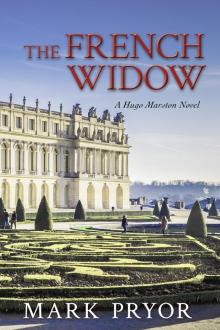 The French Widow
The French Widow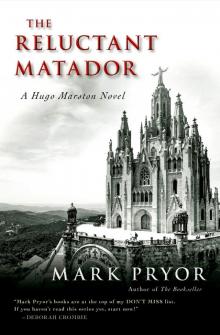 Hugo Marston 04 - The Reluctant Matador
Hugo Marston 04 - The Reluctant Matador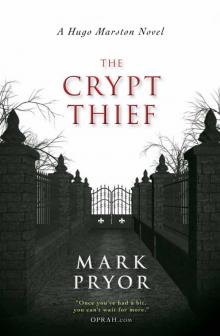 The Crypt Thief
The Crypt Thief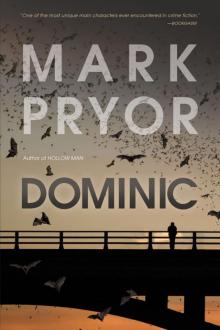 Dominic
Dominic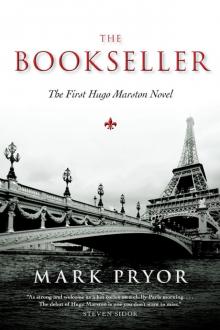 The Bookseller
The Bookseller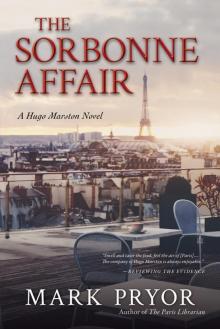 The Sorbonne Affair
The Sorbonne Affair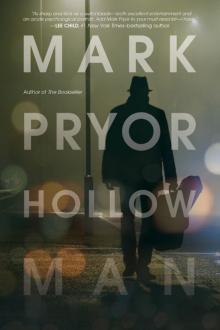 Hollow Man
Hollow Man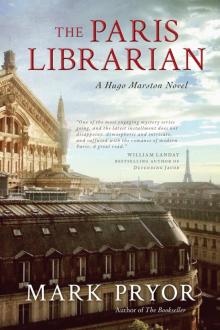 The Paris Librarian
The Paris Librarian